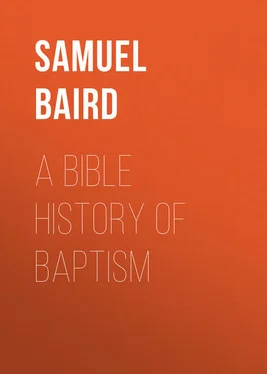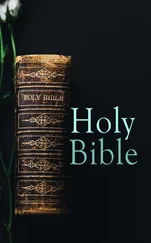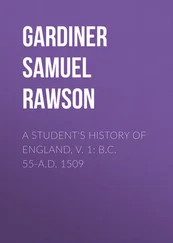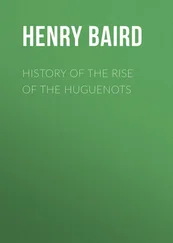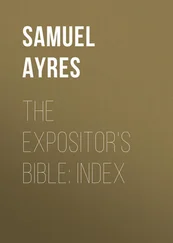Samuel Baird - A Bible History of Baptism
Здесь есть возможность читать онлайн «Samuel Baird - A Bible History of Baptism» — ознакомительный отрывок электронной книги совершенно бесплатно, а после прочтения отрывка купить полную версию. В некоторых случаях можно слушать аудио, скачать через торрент в формате fb2 и присутствует краткое содержание. Жанр: foreign_antique, foreign_prose, на английском языке. Описание произведения, (предисловие) а так же отзывы посетителей доступны на портале библиотеки ЛибКат.
- Название:A Bible History of Baptism
- Автор:
- Жанр:
- Год:неизвестен
- ISBN:нет данных
- Рейтинг книги:5 / 5. Голосов: 1
-
Избранное:Добавить в избранное
- Отзывы:
-
Ваша оценка:
- 100
- 1
- 2
- 3
- 4
- 5
A Bible History of Baptism: краткое содержание, описание и аннотация
Предлагаем к чтению аннотацию, описание, краткое содержание или предисловие (зависит от того, что написал сам автор книги «A Bible History of Baptism»). Если вы не нашли необходимую информацию о книге — напишите в комментариях, мы постараемся отыскать её.
A Bible History of Baptism — читать онлайн ознакомительный отрывок
Ниже представлен текст книги, разбитый по страницам. Система сохранения места последней прочитанной страницы, позволяет с удобством читать онлайн бесплатно книгу «A Bible History of Baptism», без необходимости каждый раз заново искать на чём Вы остановились. Поставьте закладку, и сможете в любой момент перейти на страницу, на которой закончили чтение.
Интервал:
Закладка:
3. “A kingdom of priests.” Israel’s acceptance of the first condition of the covenant, “If ye will obey my voice,” erected them into a kingdom, of which God was the alone sovereign, – the kingdom of God. This promise defines the character and function of that kingdom, – “a kingdom of priests;” or, rather, “a priest-kingdom.” Israel was thus ordained to the exalted office of intercessory mediation for the world, and of testimony to it on God’s behalf. Had ten righteous men been found in the cities of the plain, they would have been spared, for the sake of those ten. (Gen. xviii, 32.) The angels of destruction could do nothing to Sodom until Lot departed out of it. (Ib. xix, 22.) Had one righteous man been found in Jerusalem in the days of Jeremiah, the city would have been spared for the sake of that one. (Jer. v, 1.) Aaron the priest, with his golden censer – a type of the prayers of the saints (Rev. v, 8; viii, 3) – standing between the living and the dead, stayed the plague in the camp of Israel. (Num. xvi, 46-48.) So, Israel itself was now ordained a mediating priest, to stand for the time then present, between the living and the dead of the nations, in the ordinances at the sanctuary, uplifting a censer of intercession which stayed the sword of justice that was ready to destroy them; and appointed to become at length the agent of the world’s salvation, through atonement made by one of their nation, and the gospel sent forth from Jerusalem to all the world, by the preaching of Israel’s sons. Thus was it a priest-kingdom, set apart and sanctified of God, to be for salvation to all the ends of the earth.
This priestly consecration of Israel, moreover, constituted her a witness on behalf of God among the nations. It was the lighting of a lamp to shine amid the darkness of the world. The office to which she was thus ordained was not yet aggressive; for the times of the Gentiles were not come. Yet was hers none the less a public and active testimony, which, if they would, the Gentiles could hear, a gospel light which did, in fact, penetrate far into the darkness, and prepared the nations for the coming of Christ and the gospel day. For the time being, it was the office of Israel to cherish the light, by keeping the oracles and maintaining the ordinances of God’s worship, and transmitting them to their children, until the fullness of time.
4. “A holy nation.” The word “holy” primarily designates the completeness and symmetry of the moral perfections of God. From hence, it is transferred to those attributes in the intelligent creatures which are in the likeness of God’s holiness. And, as the distinguishing characteristic of holiness in a creature is surrender and consecration to God, the word is used to designate all such things as are his by peculiar dedication to his service. Thus, the altar, the tabernacle, and all the vessels and things pertaining thereto, were holy. So the tithe of the land, of the flocks, and of the herds, was holy; and the firstborn of men and of beasts. (Lev. xxvii, 30, 32; Luke ii, 23.) In this sense of accepted consecration, and of appropriation to himself, God here puts upon Israel the designation of “a holy nation.” Henceforth, they were so named, and the obligation implied therein constantly insisted upon, as demanding from them real separation to God, and holiness of heart and life. Says the Lord: “Ye shall be holy men unto me, neither shall ye eat any flesh that is torn of beasts in the field.” – Ex. xxii, 31. Moses exhorts them to abhor and destroy the idols of the land, “For thou art a holy people unto the Lord thy God; the Lord thy God hath chosen thee to be a special people unto himself, above all people that are upon the face of the earth… Thou shalt, therefore, keep the commandments and the statutes and the judgments which I command thee this day to do them.” – Deut. vii, 6-11. From this article of the covenant, the New Testament designation of the members of the visible church is derived. Says Peter, “Ye are a chosen generation, a royal priesthood, a holy nation , a peculiar people.” – 1 Peter, ii, 9. Hence, the name of “saints,” or, “holy ones,” which, familiar in the Psalms, is constantly used in the epistles, as the distinctive title of the members of the New Testament Church.
Thus it appears that in all the provisions of the covenant earthly and temporal blessings are not once alluded to. That clause of the Abrahamic covenant which concerned the possession of Canaan was, indeed, referred to at Sinai, and Israel was assured of its fulfillment. (Ex. xxiii, 23.) But it was then, and ever after, spoken of and treated as already and finally settled by the promise made to Abraham. (Ex. vi, 3-8; Deut. vii, 7-9; ix, 5, 6; Psalm cv, 8-11.) Moreover, the bestowal of Canaan was in no sense a secular transaction. Not only as a type of the better country was it designed and calculated to awaken and stimulate heavenly aspirations. (Heb. xi, 8-16.) But, like the fastnesses of the Alps, for centuries the retreat and home of the gospel among the martyr Waldenses, Canaan, planted in the very center of the old world-empires, and upon the mid line of march of the world’s great history, was chosen and prepared of God as a fortress of security entrenched for Israel’s protection, in the midst of the apostate and hostile nations, while tending and nourishing the beacon fire of gospel light which glowed on Mount Zion, and shed its beams afar into the gloom of thick darkness which enshrouded the world. As such, it was assured to Abraham’s seed by the covenant with him and the seal set in their flesh.
Section X. — The Visible Church was thus established
The Sinai covenant gave origin to the visible church of God. By the visible church, I mean that society among men which God has called and taken into covenant and communion with himself, and ordained to be his witness to the world. Two points are essentially involved in the definition. The first is the relation to God established by the terms – “I will take you to me for a people; and I will be to you a God.” The second is the office to which the church is thus called and ordained, to be God’s witness, testifying on his behalf against the world’s apostasy. Such is Peter’s declaration, quoting the terms of the Sinai covenant, and applying them to the New Testament church: “Ye are a chosen generation, a royal priesthood, a holy nation, a peculiar people; that ye should show forth the praises of him who hath called you out of darkness into his marvelous light; which in time past were not a people, but are now the people of God .” – 1 Peter ii, 9, 10. This privilege of communion, and this office of testimony were implied and involved in the whole covenant, and all its terms; but especially indicated by that expression, “Ye shall be unto me a kingdom of priests, and a holy nation .” It is the privilege of priests to draw nigh to God, and their office to testify on God’s behalf to men.
The manner and meaning of the designation by which, throughout the Greek Scriptures of the Old Testament and of the New, the body thus constituted is known as the ekklēsia , the church, is worthy of special notice in this connection. The fact of God having met with Israel at Sinai, and communed with them in an audible voice, is referred to by Moses and emphasized as being a signal demonstration of relations established of extraordinary intimacy. “What nation is there so great, which hath God so nigh unto them as the Lord our God in all things that we call upon him for?.. Take heed to thyself, and keep thy soul diligently, lest thou forget the things which thine eyes have seen, and lest they depart from thy heart, all the days of thy life; but teach them thy sons and thy sons’ sons, specially the day that thou stoodest before the Lord thy God in Horeb, when the Lord said unto me, Gather me the people together, and I will make them hear my words, that they may learn to fear me all the days that they shall live upon the earth, and that they may teach their children… And the Lord spake unto you out of the midst of the fire; ye heard the voice of the words, but saw no similitude; only ye heard a voice.” – Deut. iv, 7-13. Again, he says: “Ask now of the days that are past, which were before thee, since the day that God created man upon the earth, and ask from one side of heaven unto the other, whether there hath been any such a thing as this great thing is, or hath been heard like it. Did ever people hear the voice of God speaking out of the midst of fire, as thou, hast heard, and live? Or hath God assayed to go and take him a nation from the midst of another nation, by temptations, by signs, and by wonders, and by war, and by a mighty hand, and by a stretched out arm, and by great terrors, according to all that the Lord thy God did for you in Egypt before your eyes? Unto thee it was showed, that thou mightest know that the Lord he is God; there is none else beside him.” – Ib. iv, 32-35.
Читать дальшеИнтервал:
Закладка:
Похожие книги на «A Bible History of Baptism»
Представляем Вашему вниманию похожие книги на «A Bible History of Baptism» списком для выбора. Мы отобрали схожую по названию и смыслу литературу в надежде предоставить читателям больше вариантов отыскать новые, интересные, ещё непрочитанные произведения.
Обсуждение, отзывы о книге «A Bible History of Baptism» и просто собственные мнения читателей. Оставьте ваши комментарии, напишите, что Вы думаете о произведении, его смысле или главных героях. Укажите что конкретно понравилось, а что нет, и почему Вы так считаете.
